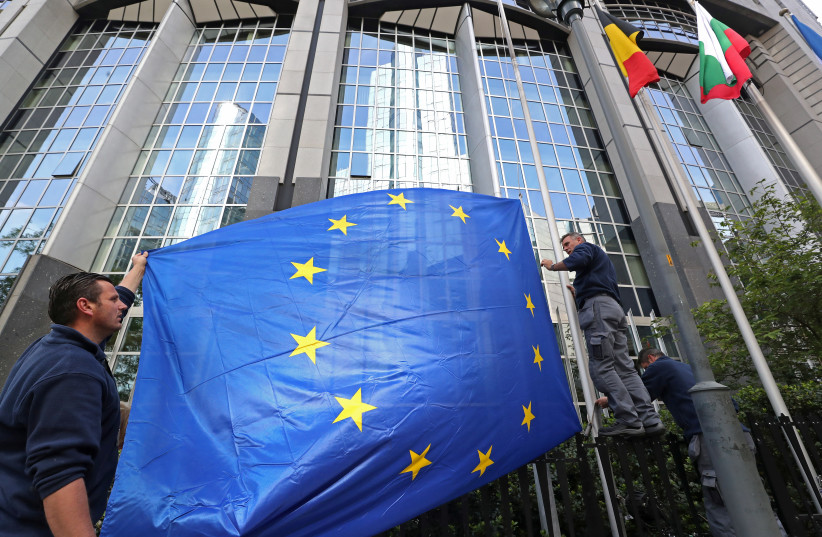As if the ongoing war in Gaza, the 120 remaining Israeli hostages, and the increasing threats from Iran and Hezbollah were not enough, Israel currently finds itself in a very volatile political situation from an international perspective.
In the last two months alone, Europe has seen elections in the European Union, Belgium, the United Kingdom, France, Iceland, and Bulgaria.
There is wide-ranging speculation, from warnings about a rise of far-Right political parties in Europe to cautious optimism that a moderate center might re-emerge.
All this comes ahead of momentous elections in the United States in November and in the middle of a seemingly never-ending war in Ukraine.
The underlying trend, across the European continent, of ascending right-wing parties is undeniable.

In the European Parliament (EP), a new political group was just established: Patriots for Europe, which encompasses 84 members from 12 countries (France, Hungary, Italy, Czech Republic, Austria, Netherlands, Spain, Flanders (in Belgium), Portugal, Denmark, Greece, and Latvia. This is the third-largest group in the parliament and the largest right-wing group ever to have existed in the EP.
The same is happening on the national level: The new Dutch government was formed by Geert Wilders, leader of a Right-to-far-Right party; and in France, Le Pen’s party won 33 % in the first round of elections. Hard right-wing parties lead governments in Italy, Sweden, Finland, Slovakia, Hungary, Croatia, and the Czech Republic.
A new political reality in Europe?
Even young voters – for the first time, the age for the EU elections was lowered to 16 – voted more conservatively than expected, implying that this is a sign of a new political reality in Europe.
Historically, Israel has sought to engage with centrist parties through consensus, balancing between its right to defend itself (an issue closer to conservative circles) and its obvious commitment to fighting discrimination and antisemitism (an issue traditionally championed by more progressive groups).
Far-Right and far-Left parties were seen as extremist and often as heirs to fascist and Communist ideologies respectively. Consequently, Israel shied away from engaging with either.
This paradigm is now being seriously challenged as the political map in Europe becomes increasingly polarized, especially regarding issues concerning Israel and the safety of the Jewish communities, most significantly since the October 7 Hamas massacre.
On one hand, hard-Right parties offer their unwavering support now, when Israel needs it most.
Geert Wilders openly stated his full support for Israel: “Keep strong, my Israeli friends, in fighting Hamas. The United Nations, the United States, and Europe don’t understand you are fighting an existential war against the dark forces of hate and destruction called Hamas. I will always support you.”
In a speech before parliament, Marine Le Pen openly condemned the “pogroms on Israeli soil” and France’s insufficient attempts at protecting Jewish life in the country.
At the same time, left-wing-leaning leaders of countries like Spain, Ireland, Norway, and Belgium were the most vocal in criticizing Israel and accusing it of human rights violations, while failing to condemn Hamas’s terrorist attack, at times even openly supporting it.
This became particularly apparent in the cases against Israel brought before the International Court of Justice (ICJ) and the International Criminal Court (ICC) in The Hague, in which those countries were the ones upholding false genocide claims and delegitimizing Israel’s right to defend itself, with Spain being the most vocal.
IT WOULD be a mistake, however, to misinterpret this polarization and view it through Israel-centric lenses.
European reactions to the war and the horrors of October 7 are only a byproduct of much larger pan-European sentiments that revolve around issues such as immigration and economic (China) and military (Russia) fears.
That is what the election results clearly showed.
This is why Israel must develop a more sophisticated diplomatic approach that will know how to part ways with the old paradigm.
One key will be recruiting support from “smaller” countries that have a major say in appointing EU commissioners responsible for making policy and can significantly influence or veto EU policies on the EU Council level.
When it comes to engaging with the extremes of the political map, Israel should engage locally, using country-specific and unique bilateral dialogue.
This still means taking global geopolitical developments into account and emphasizing strategic relationships with major European powers such as Germany, the UK, and France.
But, in parallel, Israel must invest significantly more in relationships with other countries that, especially if they join forces, can seriously counter the dominant voices inside the EU.
It’s important to understand that these countries too, increasingly set their priorities through seeking to forge regional strategic alliances that go beyond the EU and its member states.
This means that increasing Central European and Balkan countries in Europe becomes more important than ever, as they too can – indirectly – impact broader EU policies.
Whether addressing the threat of arrest warrants against senior Israeli politicians and soldiers, as proposed at the ICC, or the fear of an international arms embargo, European countries will stay divided and Israel’s only chance of garnering enough support is through careful engagement on a bilateral level.
Fleur Hassan Nahoum is Israel’s special envoy for innovation, a former deputy mayor of Jerusalem, and a senior fellow at the Misgav Institute for National Security
Olga Deutsch is an expert on European Israel Relations and vice president of NGO Monitor.
